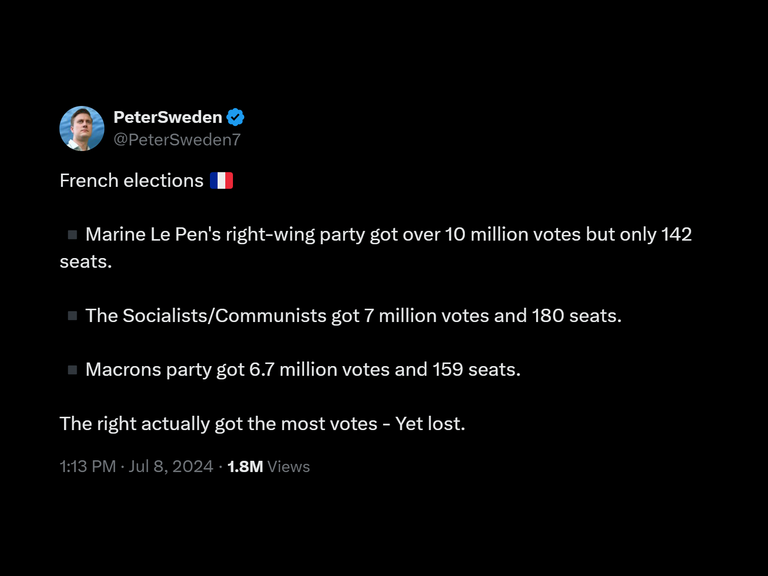Die französische Demokratie ist fehlerhaft, nicht unbedingt demokratisch, Mehrheitswahlrecht führt zu skurrilen Ergebnissen, wie die Partei mit den meisten Stimmen nur den dritten Platz erreicht hat.
Das Mehrheitswahlrecht spielt normalerweise der stimmenstärksten Partei in die Hände und hilft dieser eine absolute Mehrheit zu beschaffen. Das ist bereits umstritten.
Der Mechanismus funktioniert vereinfacht so, dass die Partei mit den meisten Stimmen in einem Wahlkreis alle Sitze zugesprochen bekommt.
In Frankreich ist es noch eine Spur komplizierter, erreicht beim ersten Wahldurchgang keine Partei die absolute Mehrheit gibt es eine zweite Runde, mit den zwei stimmenstärksten Parteien.
Allerdings dürfen beim zweiten Durchgang auch Parteien antreten, die mehr als 12.5% der Stimmen bei der ersten Runde erhalten haben.
In dieser zweiten Phase kommt es normalerweise zu taktischen Tricks, die regierenden Parteien versuchen mit Wahlbündnissen Koalitionen gegen Rechts zu schmieden, damit rechte Parteien keine Mehrheit bekommen.
Diesmal hat das aber nicht ganz so wie geplant funktioniert. Macron hat sich verspekuliert. Die Neue Volksfront, eine extrem linke Partei hat nicht mitgemacht und ist als dritte Partei gegen Macron und Le Pen angetreten.
Das Ergebnis ist jetzt, dass das Bündnis von Le Pen zwar die meisten Stimme bekommen hat, aber die Volksfront die meisten Sitze im Parlament.
Und der abgeschlagene Ensemble von Macron ist plötzlich zweiter geworden, kann aber trotzdem nur schwer eine Koalition bilden.
Mit Demokratie hat das Ergebnis nicht mehr viel zu tun, sondern es ist mehr ein Resultat des eigenartigen Wahlmechanismus.
Mathematisch betrachtet kommt es beim Mehrheitswahlrecht zu Rundungsfehlern, die sich im Worst-Case aufsummieren und dann zu solchen skurrilen Ergebnissen führen, wenn es keinen eindeutigen Gewinner gibt oder mehr als zwei etwa gleichstarke Parteien beim zweiten Durchgang antreten.
Was sagt ihr dazu? Ist ein Mehrheitswahlrecht noch zeitgemäß oder unterminiert es das Vertrauen in die Demokratie?
France Elections 2024

https://x.com/PeterSweden7/status/1810270921548087704
French Parliament Election Result 2024 Popular Vote vs. Seats (Second Round, Final Result)
| Party | Votes | Votes % | Seats | Seats % |
|---|---|---|---|---|
| National Rally (Le Pen) | 10,109,044 | 37.06% | 142 | 24.61% |
| New Popular Front (Melenchon) | 7,039,429 | 25.80% | 180 | 31.20% |
| Ensemble (Macron) | 6,691,619 | 24.53% | 159 | 27.56% |
Source: https://en.wikipedia.org/wiki/2024_French_legislative_election#Results
France's Stunning Election Results Explained
Video credit: TLDR
English
French democracy is flawed, not necessarily democratic, here is why.
Majority voting usually plays into the hands of the party with the most votes and helps it to obtain an absolute majority. This is already controversial.
In simple terms, the mechanism works in such a way that the party with the most votes in a constituency is awarded all seats.
In France, it is a little more complicated: if no party achieves an absolute majority in the first round of voting, there is a second round with the two parties with the most votes.
However, parties that received more than 12.5% of the vote in the first round are also allowed to run in the second round.
Tactical tricks are normally used in this second phase, the ruling parties usually trying to forge coalitions against the right with electoral alliances so that right-wing parties do not get a majority.
This time, however, it didn't quite work out as planned. Macron has made a mistake. The New Popular Front, an extreme left-wing party, did not participate and ran as a third party against Macron and Le Pen.
The result is that although Le Pen's alliance won the most votes, the Popular Front won the most seats in parliament.
And Macron's defeated Ensemble has suddenly come second, but is still finding it difficult to form a coalition. Chaotic result.
The result no longer has much to do with democracy, but is more a result of the peculiar electoral mechanism.
From a mathematical point of view, majority voting results in rounding errors that add up in the worst-case scenario and then lead to such bizarre results if there is no clear winner or more than two parties of roughly equal strength compete in the second round.
What do you think? Is a majority voting system (winner takes it all system like in the UK or France) still legitimate or does it erode confidence in democracy?
Live your Secrets and Hive Prosper 🍯
xx Viki @vikisecrets
